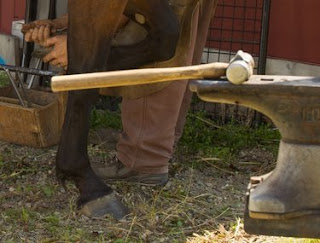The blacksmithing and farrier trades are some of the few kinds of work left in the world that use equipment to which the words “disposable,” or “planned obsolescence” don’t seem to apply. I mean, I guess you can upgrade a knife, but only so much.
The tools of your trade were built to last. That’s why you pay so-o-o-o-o much money for them. So you know you should take excellent care of them. Of course you know. But tools are one of those things that are so basic to the farrier’s job that they’re easy to ignore until something goes wrong with them. Here are just a few tips and reminders for taking care of your equipment so it can go the distance.
Forge
Follow manufacturers’ instructions so you’re always using the forge as it was designed to work. This is a super boring tip, but it’s also probably the best thing you can do to prolong your forge’s life.
Replace the liner when it becomes thinner than 1 inch to keep your forge properly insulated. Replacements should be available from the manufacturers.
Regularly check all hoses, electrical cords, gauges and valves for wear and tear, and replace as necessary.
Keep the forge clean of carbon buildup with welding tip cleaners. The forge can be blown out with an air compressor, or cleaned out with a brush.
Anvils
Select the anvil that’s right for the job you’re doing. The weight, shape of the horn and the design should be functional so you’re always working with it and not against it.
Keep the anvil in good shape – if there are nicks on the face, chips on the edges or welding residue building up on it, chances are much higher that if you have a misstrike, you will also have small but dangerous projectiles chipping off of it.
Warm up the face of your anvil before using it (or try to keep it warm). Warm anvils are less susceptible to stress damage than cold ones. You can try heating up a piece of steel and placing it on the face of the anvil for a couple of minutes until the whole anvil face is warm.
Store your anvil under a cotton towel to absorb any moisture in the air and to keep dirt and grit from the face of it.
Make sure you’re using hammers lighter than 1/30 to 1/50 the weight of the anvil, and that you keep whatever you’re hammering in the centre of the anvil’s face or the thicker portions of the horns.
Don’t store things on your anvil, and keep it out of the damp. Treat with WD40 or wax to inhibit rust.
Knives
Keep knives sharp and avoid using them if they start to get dull. Dull knives are more dangerous for you, since you’ll have to put more pressure on them, and they’re more likely to get damaged.
Buff knives on a wheel to sharpen them.
Some suggest that carbon steel knives benefit from a light coat of a natural oil when they’re not in use to keep them from corroding.
Hammers and Other Tools
Pick tools that will allow you to use them correctly. They should fit easily to your hand and be a weight that’s easy for you to work with repeatedly.
Use a buffing wheel (often called a deburring wheel) to clean nippers and other tools. 1700-1800 rpm will give you the best results.
Use a wire brush to clean rasps. Hoof picks and screwdrivers can also work.
Spray tools with WD-40 if they’re still damp when you’re done work to draw out moisture.
Oil any tool with a hinge once a week, using 3-in-1 oil, but not too much of it. You want it to lubricate the hinge, not act like a magnet for every bit of dust and grit within a 12 foot radius. Not only is that really gross, but dirt puts a lot of wear and tear on the joints and surfaces of your tools.
Watch for the mushrooming heads that striking tools can get over the years, and grind the tools down when you see it developing. The tools will last longer, and you’ll avoid having the head of the tool fly apart on impact.
Wire brush cleanings can help keep tools free of rust and can help smooth out any burrs that develop.
Handles
If a handle gets slippery, try a light coat of beeswax or pine tar on it.
Handles should be kept smoothly sanded to prevent cracks and chips from developing. Also, nobody likes splinters.
Handles can also be oiled to keep them from getting too dried out and cracking.
The best way to ensure a long life for your tools is to clean them regularly and keep them in a box or other dry place where they can stay as clean as reasonably possible. No tool will last forever, but a little attention goes a long way to maintaining them. If only horses were this easy…









